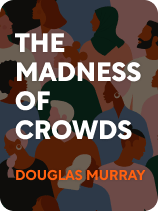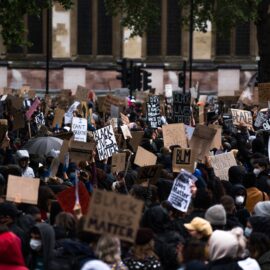

This article is an excerpt from the Shortform book guide to "The Madness of Crowds" by Douglas Murray. Shortform has the world's best summaries and analyses of books you should be reading.
Like this article? Sign up for a free trial here.
Where do you look to find meaning in life? How do you perceive injustices in society?
In The Madness of Crowds, Douglas Murray shares his concerns about where society is heading. He offers two practical steps that each person can take to turn things in a positive direction: depoliticize your personal identity and gain a healthy perspective on injustice.
Keep reading to learn how to make society better with these recommendations.
How to Make Society Better
While nearly everyone would agree that society has problems, not as many know how to make society better. In his book, Murray offers several strategies. Let’s examine two that you can take on as an individual: finding meaning outside politics, and gaining perspective on issues of discrimination.
Action #1: Find Meaning Outside of Politics
The most urgent of these strategies is to diminish the role of politics and its ensuing competitiveness in our lives. By this, Murray doesn’t mean that you should stop being interested or active in politics. This is part of who we are as human beings, and democracy is all about individuals participating.
Rather, Murray argues that we need to stop using politics as a way to find meaning in life—in other words, we should stop making every element of life political and fighting so-called oppression and injustice. Specifically, we must eschew politics in its current form—rife with toxic competition and conflict, much of which stems from the influence of the New Ideology. We should seek meaning in healthier areas of life—for instance, in our personal relationships with family, friends, and spouses.
(Shortform note: Some research suggests that in certain countries, relatively few people currently find meaning in their relationships. A 2021 survey asked respondents from 17 countries to state what gave them meaning in life. Roughly 56% of Australians surveyed mentioned family and children as lending especially significant meaning to their lives. This means that nearly half of those surveyed didn’t feel this way. Further, Australian respondents scored the highest in this regard; even fewer respondents from other countries reported finding meaning in their families, dropping to as low as 15% of Taiwanese respondents.)
| Is Partisanship Good for Our Health? Not everyone agrees that political competition is necessarily bad for us. Healthy partisan political competition, for example, has been linked to healthier populations. One study, which examined populations in all 50 US states between 1880 and 2010, showed that people in states where parties regularly alternated election wins exhibited better health, education, and economic norms than those in states where one party tended to enjoy long-term incumbency. One explanation for this may be that states where parties have to vie more vehemently for office spend more on infrastructure and public welfare measures. This is likely because it’s even more urgent for both parties to build appealing records with the public to stay in office. |
Action #2: Gain Perspective on Issues of Discrimination
Murray also suggests that we should think about occurrences of injustice in our society with a sense of proportion. He argues that, even though discrimination still exists in Western society, it’s far less prevalent or acute than it was in the past. Further, in other regions of the world, minority rights lag dramatically behind where they are in the West. Therefore, while we still have some work to do in fully removing bias and unfairness from our society, we should be grateful for the progress already made.
| Global Attitudes Toward Homosexuality Murray’s assertion that tolerance of minorities in the Western world is higher than it is elsewhere is, in some cases, backed by research. For instance, acceptance of homosexual lifestyles is noticeably higher in North America and Western Europe than in Eastern Europe, sub-Saharan Africa, and the Middle East. Multiple variables can affect these differences, such as religion and political leaning. Individuals in regions with religious affiliation tended to be statistically less accepting of homosexuality than those who lack religious affiliation, and liberal people tend to be more tolerant of homosexuality than conservatives. However, general tolerance towards LGBTQ+ communities appears to be on the rise in several such regions. For example, throughout the first decades of the 2000s in Japan and Mexico, more favorable views of LGBTQ+ people rose from roughly 50% to 70%. |

———End of Preview———
Like what you just read? Read the rest of the world's best book summary and analysis of Douglas Murray's "The Madness of Crowds" at Shortform.
Here's what you'll find in our full The Madness of Crowds summary:
- That Western society is consumed by social justice and identity politics
- Why we must combat this ideology and restore opportunities for disagreement
- How conservative viewpoints are being silenced and possible remedies






